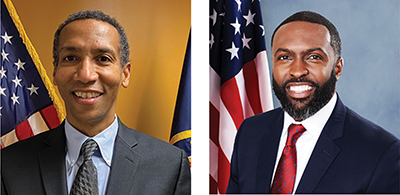By Vercie Lark, Region 7 Great Plains Administrator and Ted James, Region 6 South Central Administrator, U.S. Small Business Administration
Being Black and walking away from a person who legally owned you became reality on June 17, 1865, when Texas became the last state to implement the Emancipation Proclamation. The day, now known as Juneteenth, has become one of celebration for Black Americans.
It was a start. As Black Americans, however, we continually must ask the question: “Are we truly emancipated?”
While important to celebrate a day that freed our ancestors from the physical bondages and the inhumane capacity of slave owners to treat them as less than human beings, we must also look to the day as a reminder we have yet to successfully free Black community, from the vestiges of restraints, controls and power structures that bond us far beyond the physical realm of being enslaved.
Participating in capitalism through business ownership is one of them. Many people were then, and still remain reluctant to accept our access of all that our country offers. The quest for equity, fairness and impartiality –at the least from the federal government – has been attempted through years of court rulings and reforms. Still, equity in America, even after 157 years, is a work in progress.
- According to an analysis from the White House Council of Economic Advisers, differences in business ownership account for 20 percent of the wealth gap between average white and Black households. The analysis noted that people of color, women, and those from rural areas are underrepresented in their share of total Federal procurement dollars, even relative to their low rates of ownership in the general economy.
Seeing that a whole government corrective action was needed, the Biden/Harris Administration instructed by executive action more than 90 federal agencies to scour their agencies for changes they could make to provide more equity in services and programs to the underserved – a group which includes Black Americans and other communities disproportionately impacted by poverty and inequity over the years. In response, agencies released a combined total of 300 new actions to address barriers to equity in federal services.
The federal government procures 90% of its goods and services in America each year, and is the largest purchaser in the world, so access to the federal marketplace is an obvious key to economic equity.
The Biden/Harris Administration has set an agency goal of increasing federal spending to small, disadvantaged businesses by 50% by fiscal year 2025. Acting on that goal, the U.S. Small Business Administration made several changes to give disadvantaged small businesses more access to federal contracting dollars.
The SBA worked with federal agencies to set up measures so they could accurately track spending and publicly report progress. That awareness has already raised governmentwide spending with Small Disadvantaged Businesses to 11% this year, from 5% the previous year.
Additionally, the SBA has allocated more funding to resource partners who counsel and train small businesses to enter not only the contracting world but to start and grow their businesses. This funding added 24 new Women’s Business Centers in 2021, thus tripling of the number of centers located on the campuses of Historically Black Colleges and Universities and continues the expansion of largest WBC network in the history of the SBA. With these new additions, the complete listing of WBCs housed on the campuses of Historically Black Colleges and Universities (HBCUs) now include:
- Morgan State University, Baltimore (MD)
- Benedict College, Columbia (SC)
- Virginia Union University, Richmond (VA)
- Jackson State University, Jackson (MS)
- Alcorn State University, Lorman (MS)
- Winston-Salem State University, Winston Salem State (NC)
- Bennett College, Greensboro (NC)
- Miles College, Fairfield (AL)
- Bowie State University, Bowie (MD)
- Savannah State University, Savannah (GA)
In an effort to increase the number of Black Americans participating in the SBA 8(a) contracting program by 12,000 nationwide, the SBA is also increasing its outreach to the National Urban League, specific sororities and fraternities for Black Americans, and business students at HBCUs to expand their knowledge about business ownership and federal contracting.
Being realists, we know these reforms will not work overnight to transform areas of poverty into wealthy enclaves or combat the many pockets in our nation where institutional racism or lending disparities still exist.
But if capitalism is to work to sustain our nation’s people, our federal government, first, and then our whole country needs reforms. Poverty knows no boundaries. Struggle is struggle – even in a country that boasts the greatest wealth on earth. And the federal government alone cannot change that.
For capitalism to work – all of us must get engaged to individually and collectively provide solid financial and business learning and mentoring experiences to our children and build community ecosystems where the possibility of small businesses, wealth accumulation and a working capitalism can exist.
The SBA and its resource partners are committed to providing training and counseling on creating and sustaining small businesses for every client – whether they live in a poverty pocket, a rural town or are held back because of skin color or gender designation. Visit us at www.sba.gov
As a start, the federal government is on the right track on this issue. It may bring a higher tide to lift some boats, but we are all going to have to paddle much harder together if we are to achieve equity and all of America’s people can truly enjoy the freedoms promised by democracy and capitalism.
Right now, Black Americans are still chained to systems of financial bondage. We must think beyond Juneteenth to continue to find ways to access capital, which brings real freedom.

